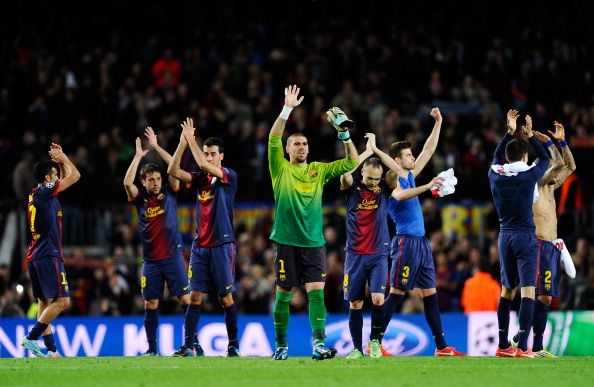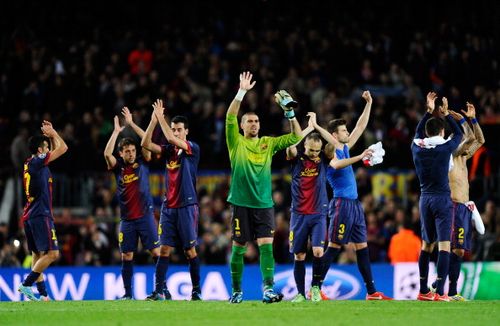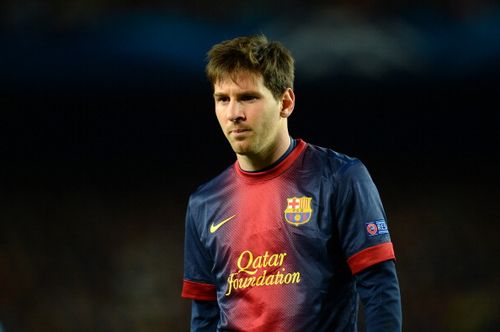
Barcelona need a Plan B, and fast
Barcelona, despite their eulogisation as the greatest team in the world, and one of the greatest of all time, suffer from strangely familiar failings: their well documented lack of a defence and their over-dependence on Lionel Messi.
Both of these worrying trends were on display against Paris Saint-Germain last night, which need to be addressed with absolute emergency. Two talking points about the Barcelona line-up last night were the presence of Messi on the bench, and the presence of Adriano at centre-back. Hardly an ideal scenario, when facing up to the Brobdingnagian monstrosity that is Zlatan Ibrahimovic.

Barcelona players celebrate after the 1-1 second-leg draw against PSG saw them through to the semi-finals at Nou Camp on April 10, 2013 in Barcelona, Spain. (Getty Images)
But with Javier Mascherano and Carles Puyol injured, the choice lay between him and youngster Marc Bartra. And even if the two first-choice defenders were to be available, they’re hardly figures to deter strikers from running straight at goal. Mascherano’s height renders him minute against physical strikers like Ibrahimovic, and Puyol’s ageing faster than he’s running these days, which is what overrides his rampant experience and his calm mentality in crunch situations.
The solution seems simple enough. Either delve into the transfer market and buy a ready replacement, or as Barcelona do, promote someone from the Barcelona youth teams. Barta is seen as the one to look forward to at the moment; however his inexperience counts against him.
Pep Guardiola also resorted to dropping Sergio Busquets into defence at times. That undermines his importance to the team and his ability as a top-class holding player, and it seems that Jordi Roura and Vilanova have decided against it. Alex Song is fast racing his way to becoming a Barcelona flop, and it is still a mystery as to why the club bought him, given his incongruity to the Barcelona style of play and that dislodging Busquets would be a herculean task, beyond Song.
Two goals were conceded against Milan, away from home, and two again against PSG. They were also extremely lucky to get away with a clean sheet against Milan at the Camp Nou. Given that Victor Valdes is hardly the greatest goalkeeper in the world, the cause for concern is greater. The club have kept only 7 clean sheets in the Liga all season, and the one against Deportivo in March was their first in thirteen games.
Come the summer transfer window, Andoni Zubizaretta would be wise to set aside a few million Euros for the club to look at a few defenders. Thomas Vermaelen, Daniel Agger, Kyriakos Papadopoulos and the like have been touted as replacements, but Barcelona have often proved rumours wrong, and will just hope that whoever they buy, ends up better off than the dismal disaster that Dmytro Chygrynskiy was, and will add much required steel and stability to the back four.
For all of Guardiola’s successes as Barcelona manager, he failed to address these two key issues. Given every great side has their loopholes, his (and now Vilanova’s) inability to shore up a defence that has gone from being porous to non-existent, stands out as a sore thumb. The issue of finding a replacement to Messi in his time of absence is a far bigger headache than the former though.
Guardiola tried to build a new system of play last season concentrating around the new signing Cesc Fabregas. That however, fell pretty flat. The presence of Fabregas among Messi, Xavi, Iniesta and Busquets does nothing more than cramp the fluidity of the side, with David Villa the sacrifice in this system. With Iniesta out wide on the left, and Fabregas in the ‘hole’ behind Messi, the side lost width, penetration and the killer instinct that Villa bought. Iniesta is crippled on the wings, and with Fabregas behind him, Messi doesn’t enjoy the freedom he usually would, as a ‘False 9′.
In Messi’s absence though, Fabregas has often seemed at his best, marked greatly by his first career hat-trick against Mallorca last weekend. Against the more stubborn defence of PSG though, the story was different. He failed to help out either in midfield, or provide the slithery danger that Messi would, and he had to make way for a half-fit Messi at the hour-mark. While he inevitably changed the game after his arrival, creating Pedro’s equaliser, the matter of greater concern was that Barcelona are hardly the same side without Messi as they are with him.
David Villa, at 31, is past his prime, and performances like the one in the 4-0 defeat of Milan are few and far between now. Pedro is still a winger more than a striker, though his finishing has improved over the course of this season. Alexis Sanchez, like Fabregas, is another strange case. So influential at Udinese over the 2010-11 season, he has never quite been able to match up to those standards in a side which is no longer built around him. He isn’t offered the freedom of movement with Messi in the side, and yet isn’t quite the finisher yet to warrant his place in the side in his absence.

Lionel Messi looks on during the UEFA Champions League quarter-final second leg against Paris St Germain at Nou Camp on April 10, 2013 in Barcelona, Spain. (Getty Images)
The PSG tie will be one of the most forgettable Champions League ties for the club in recent history, and they will consider themselves extremely lucky to make it out alive. But the lack of a winning trend away from home in Europe is worrying, and clubs have also found ways of stifling the tiki-taka, as evidenced by Inter Milan in 2010, Chelsea last year, and AC Milan at the San Siro this season.
Their Plan B could well involve greater width and pace in the team, and the presence of a few physical forwards to intimidate at set-pieces, something which Barcelona are impotent at. A semi-final spot has been booked for a record sixth time, in the Champions League. However, a victory at the final in Wembley will be hard, if these niggling issues aren’t dealt with swift blows.